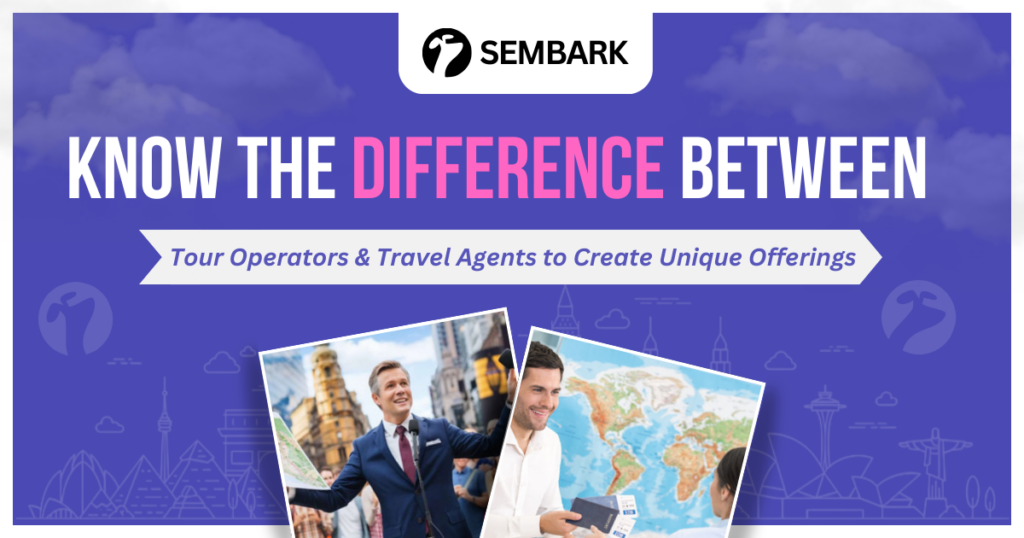The travel industry is huge with a vast pool of offerings, and booking a holiday is not just plain enough to get the most out of it. One should know the enhanced way of navigating its way – Fortunately, understanding the difference between tour operators and travel agents can simplify the process. Two key professionals in the travel industry, tour operators and travel agents, can make the experience much easier.
Learning the major difference between a tour operator and a travel agent makes you get the best out of your holiday.
At first glance, these roles might seem similar. Both assist travelers in planning trips, booking accommodations, and ensuring a smooth travel experience. However, both vary in the way they offer exclusivity, flexibility, and customization of tours.
For travel industry professionals, understanding how the services offered are different from each other is crucial to expanding their collaborations and optimizing their partnership opportunities.
This blog will explore how tour operators and travel agents differ, what they offer, and how they are evolving to meet modern travelers’ demands.
But first…
Why Understanding the Difference Between Tour Operators and Travel Agents Matter?
Not all travelers want the same thing. A structured itinerary with everything pre-arranged remains a top priority for some whereas some travelers prefer a tailored trip wherein they can plan everything according to their convenience.
Understanding how these preferences align with the services offered by tour operators versus travel agencies allows industry professionals to refine their offerings and cater to diverse market segments effectively.
This guide will help you understand the services of a tour operator vs. a travel agency and what comes along with each.
Related Read: How to Improve Profitability per Employee As A Tour Operator in India
Understanding the Basics
Before diving into the key differences, let’s define what a tour operator and a travel agent do.
A tour operator plans your holiday packages meticulously with little room for change later. Everything is organized here from transportation to accommodation to excursions. With a tour operator- it’s like a pre-planned experience.
On the other hand, a travel agent acts as a bridge between travelers and travel service providers.
They help customers book flights, hotels, and tour packages but do not directly operate or manage the tours themselves. Instead, they rely on partnerships with tour operators and other travel service providers to curate options for their clients.
It is crucial here to understand that travel agents don’t operate tours but help travelers pick the best tour for themselves by connecting them with the best travel service providers. Depending on the travelers’ needs, they connect the travelers to the right service provider.
Key Differences That Can Impact Your Travel Business
Now that you understand their roles, let’s explore how their differences affect your travel choices.
1. Structure vs. Flexibility
A major distinction between tour operators and travel agents is how structured your offerings are.
- Tour Operators: Travelers get a preview of their tour beforehand. Everything is pre-planned from transportation to accommodation and this becomes comforting for travelers who want less hassle and not much involvement in decision-making. All pre-arranged activities give them a sense of convenience where no last-minute changes are expected.
- Travel Agents: Allow for more flexibility, offering customized options. If clients prefer to explore a destination on their schedule or make last-minute changes, a travel agent provides that freedom.
If your services are more directed towards creating customized travel then promoting yourself as a travel agent will be lucrative for your travel business. But if you are experienced in creating itineraries with everything pre-planned then positioning yourself as a tour operator will help your customers to set the right expectations.
2. Cost Considerations
Cost plays a crucial role for travelers when choosing between a tour operator and a travel agent.
- Tour Operators: They operate tours in bulk and hence have variable options and can provide travelers with discounted rates. Bookings with tour operators often get travelers special rates for transportation, accommodation, and excursions.
- Travel Agents: While they may not always offer bulk discounts, they bring value by finding exclusive deals, helping customers redeem travel points, and avoiding unnecessary expenses.
Here one should know costing as much as is important for travellers- it is equally important for businesses to set up their pricing while creating their tour packages. While you decide on your profit margins- it is important to know how much each service gives you the liberty to scale your profits.
According to industry experts- tour operators have a bigger scope as they organize bulk tours however travel agents charge premiums through exclusive deals, or strategic booking. Some travelers don’t find it hefty to pay a premium given the service is fully customized for them.
3. Expertise and Specialization
- Tour Operators: Tour operators are niche experts who can suggest to travelers the best experiences. A deep dive tour is what clients expect from them. Be it a wildlife safari tour or a cultural deep dive tour- tour operators can provide travelers that serve such experiences in an organized manner.
- Travel Agents: Provide broader options across multiple destinations. Be it a multi-country trip or need assistance with multiple bookings across different providers – travel agents have wider connections and arrangements that can often fulfill travelers’ steeper demands. Exclusive demands like a personal stay in a posh palace or a secret cruise – all can be arranged by a travel agent.
A survey by the American Society of Travel Advisors (ASTA) found that 76% of travelers who used a travel agent reported their trips exceeded expectations due to expert recommendations and seamless planning.
Best for: If you have expertise in creating itineraries that can manage exclusive tours and meet customers’ unique demands then setting up a travel agency is the best thing to do, however, if creating a niche tour is something you are an expert in -then a tour operator is lucrative for you.
4. Customer Support and Problem Resolution
Unforeseen travel disruptions can happen—flights get delayed, accommodations get overbooked, or local conditions change. Who helps you when things go wrong?
- Tour Operators: As they directly operate tours, customers can avail of on-ground support. This gives travelers a sense of security in times of situations uncalled for. Tour operators also provide rearrangements if there’s an issue with the itinerary.
- Travel Agents: Act as a go-between, liaising with airlines, hotels, and other providers. They advocate for travelers but don’t control the experience directly.
If you are setting up yourself as a tour operator-make sure you are equipped with a customer support team so that your customers always get the support in handy.
As a tour agent- collaborating with locals and travel providers will help you to give your clients support whenever needed.
Related Read: Complete Guide on How to Use Travel Itinerary Builder Software for Travel Agents
Your Client’s Convenience Matters
Every traveler wants the best of both the experiences and the money spent on the tour. But not all travelers are the same nor do they want the same thing. The travel industry is a huge industry that offers a varied range of services. Sometimes travelers might get lost in a pool of options rather than getting clarity, hence understanding services helps you to craft your services better and create the best offerings for your customers.
A travel agent and tour operator might sound similar but offer different services. If one takes care of exclusivity, flexibility, and luxury then the other offers everything from visa services to transportation to accommodation to excursions, making it a convenient one.
At the end of the day, the best vacation packages are the ones that align with your customer’s expectations. So before you provide your services -decide where your expertise lies in and what better experiences you can offer to your clients. A fully curated experience or a customized journey—and let that guide your decision.
Your Ideal Travel CRM Awaits!
Sembark is a cutting-edge Travel CRM Software for DMCs in India, Malaysia, Thailand, Sri Lanka, UAE, and Azerbaijan. Book Your Demo Today!




